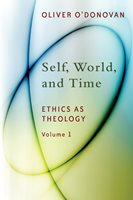Reviewed by Jacob Shatzer
O’Donovan begins a planned three-part work on “ethics as theology” by treating the themes of agency, world, and time as an “induction” to pave the way for future “explorations.” (The forthcoming volumes are entitled Finding and Seeking, which deals with the agent’s search for a path of action, and Entering into Rest, which considers the ends toward which the agent looks.) As O’Donovan notes, this first volume “is concerned primarily with the form and matter of Christian Ethics as a discipline, in relation to its material (moral thought and moral teaching), its setting among the humanistic faculties of study, and its proper shape, a triadic trajectory in which self, world, and time are reflected and restored” (xi). Though the value of this first volume will inevitably change when the context and reception of the latter two are added, its worth as a standalone reflection on ethics is evident from the start.
Foundations
The book challenges conventional ways of viewing ethics, even in connection with theology, for he puts ethics at the beginning, middle, and end of theological work (as Stanley Hauerwas’s blurb puts it). O’Donovan does this by focusing on three elements: self, world, and time. Morality requires being aware of one’s own agency, the truth of the world, and the fact that the world and the self “are co-present only in the moment of time which is open to us for action” (15). Ethics without reference to the self as agent can become mere problem-solving; lack of reference to the world leads to “a busy ‘can-implies-must’ morality; and a lack of reference to the available moment of time fails to concentrate on what is fit to be done in this time and place (17-18). This overarching interplay of self, world, and time pervades the book.
Strengths
The first strength of this work is the way that O’Donovan provides clear and simple definitions of important terms, definitions that not only make the book make more sense but make possible clearer vision of ethics and the Christian life. Morality, for instance is not “what we do, but… how we think what we are to do, which is to say, how we act” (3). Deliberation is focused “on the immediate future, the forward-looking present, the future as it beckons to the present, the present as it opens to the future. To define this moment more precisely: it is the available future, the possibility that lies open to our action” (17). The book is peppered with such moments when O’Donovan makes definitions so clear and helpful that they just seem obvious.
O’Donovan’s second strength is his apt metaphors strategically deployed throughout the work. He likens the beginning of moral experience to waking: “What seems like the beginning is not really a beginning at all. We wake to find things going on, and ourselves going on in the midst of them. The beginning is simply the dawning of our consciousness, our coming-to to what is already happening and to how we are already placed” (2). Lack of reference to the self’s agency, the real world, or the appropriate time lead to “two-legged tripods,” genuine moral diseases (18).
A third strength emerges when O’Donovan draws his triad of self, world, and time into conversation with the theological virtues—faith, hope, and love. “Their unity can be expressed by saying that the gift of self, perfected in faith, provides a point of view from which we may understand the world as affording us time to act; the gift of the world, perfected in love, provides a point of view from which we may understand the self as laying claim to its own time; the gift of time, perfected in hope, provides a point of view from which we may understand the self as active within the world” (103). This leads to a trajectory from one to the other: “Moral reasoning is realized only in a dynamic interplay of faith, love, and hope” (105).
Weakness
The main weaknesses of O’Donovan’s work here lie in its brevity. The material that he covers begs to be developed and clarified further. But since that is what he is planning to do with two additional volumes, such a critique almost isn’t worth making, assuming that it will be remedied in those works. Answering questions related to “How does this play out and connect to more concrete situations?” should make the next two volumes as helpful as this one.
Dr. Jacob Shatzer is Assistant Professor of Biblical and Theological Studies at Sterling College. He is also Book Review Editor for Ethics here at Books At a Glance.
